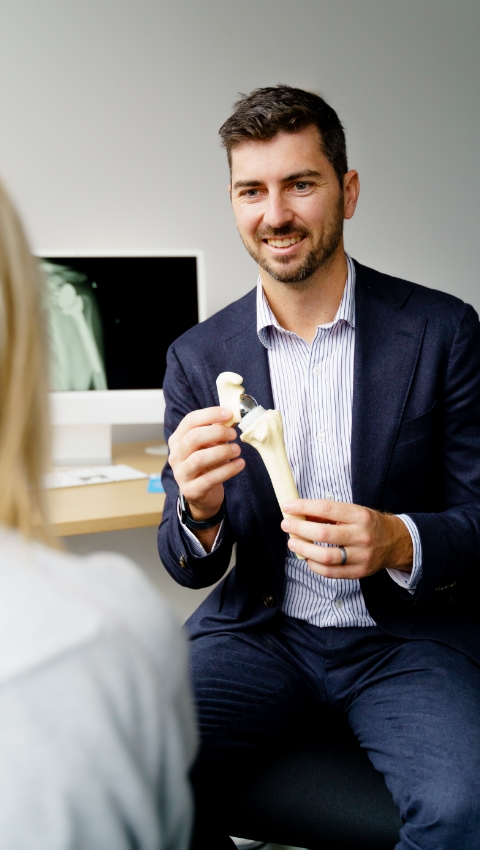What to Expect After Shoulder Surgery: Recovery Tips for a Smooth Rehabilitation
Shoulder surgery can significantly improve function and relieve pain, but the recovery process is just as important as the procedure itself. Whether you’ve undergone rotator cuff repair, shoulder stabilisation, or a full shoulder replacement, understanding what to expect post-operatively can help you navigate your rehabilitation with confidence.
Every patient’s recovery journey is unique, and with the right approach, you can regain strength and mobility effectively.

Common Types of Shoulder Surgery
Patients undergo shoulder surgery for various conditions, including:
- Rotator Cuff Repair: Addressing torn tendons to restore shoulder strength and movement.
- Shoulder Stabilisation: Often performed after repeated dislocations to strengthen the joint.
- Biceps Tendon Surgery (tenodesis/tenotomy): Treating biceps tendon injuries to alleviate pain and dysfunction.
- Shoulder Arthroscopy: A minimally invasive procedure for diagnosing and treating shoulder issues.
- Shoulder Replacement: Recommended for severe arthritis or irreparable joint damage.
Understanding the type of procedure you have undergone helps set expectations for your shoulder surgery recovery in Adelaide.
What to Expect Immediately After Surgery
Following surgery, you will be monitored in a hospital setting to ensure a smooth initial recovery.
- Pain Management: Your surgeon will prescribe pain relief and anti-inflammatory medications to keep discomfort under control.
- Use a Sling or Immobiliser: Most patients need to wear a sling to protect the shoulder and aid healing.
- Common Side Effects: Swelling, bruising, and temporary stiffness are normal in the first few days.
- Wound Care: You will receive instructions on keeping your surgical site clean and monitoring for signs of infection.
Pain Management Strategies
Effective pain management is essential for a comfortable recovery:
- Take prescribed pain medications as directed by your surgeon.
- Apply ice therapy to reduce swelling and inflammation.
- Avoid self-medicating or exceeding recommended dosages to prevent complications.
Rehabilitation and Physiotherapy
Physiotherapy plays a vital role in restoring strength and range of motion after surgery. Your rehabilitation timeline typically includes:
- First Few Weeks: Gentle movements to prevent stiffness while avoiding strain on the healing shoulder.
- First Few Months: Gradual strengthening exercises guided by a physiotherapist.
- Long-Term Recovery: Continued improvement in mobility and strength, leading to a return to daily activities.
Following prescribed shoulder rehabilitation exercises ensures steady progress while minimising the risk of re-injury.
Tips for a Smooth Recovery at Home
To make your recovery more comfortable:
- Prepare Your Home: Keep essential items within easy reach to avoid unnecessary movement.
- Use Supportive Pillows: Sleeping in an elevated position may reduce discomfort.
- Maintain Good Posture: Poor posture can place additional strain on the shoulder.
- Follow a Healing Diet: Stay hydrated and consume anti-inflammatory foods like leafy greens, nuts, and fish.
Potential Challenges and How to Manage Them
Recovering from shoulder surgery can present some difficulties:
- Stiffness and Limited Mobility: Normal in early recovery but improves with physiotherapy.
- Emotional Challenges: Frustration and impatience are common; staying motivated is key.
- Signs of Complications: Watch for excessive swelling, fever, or worsening pain, which may indicate an infection or other issues.
When to Contact Your Orthopaedic Surgeon
While mild discomfort is expected, seek medical attention if you experience:
- High fever or severe swelling
- Sudden loss of movement or sensation
- Persistent pain unrelieved by medication
- Concerns about wound healing
Prompt communication with your surgeon ensures any potential complications are addressed quickly.
Why Choose Dr Oscar Brumby-Rendell for Shoulder Surgery and Recovery
Dr Oscar Brumby-Rendell is a highly skilled orthopaedic surgeon for shoulder surgery in Adelaide, offering expert care for a wide range of shoulder conditions. His approach prioritises:
- Specialised expertise in upper limb procedures
- Comprehensive post-surgical care plans
- A commitment to personalised rehabilitation strategies
With Dr Brumby-Rendell’s guidance, patients receive tailored treatment plans that focus on achieving the best possible outcomes.
Recovering from shoulder surgery doesn’t have to be overwhelming. With the right care and guidance, you can regain strength and mobility confidently.
Book a follow-up appointment with Dr Oscar Brumby-Rendell, Adelaide’s trusted upper limb orthopaedic specialist, to ensure recovery is on track and tailored to your needs.
